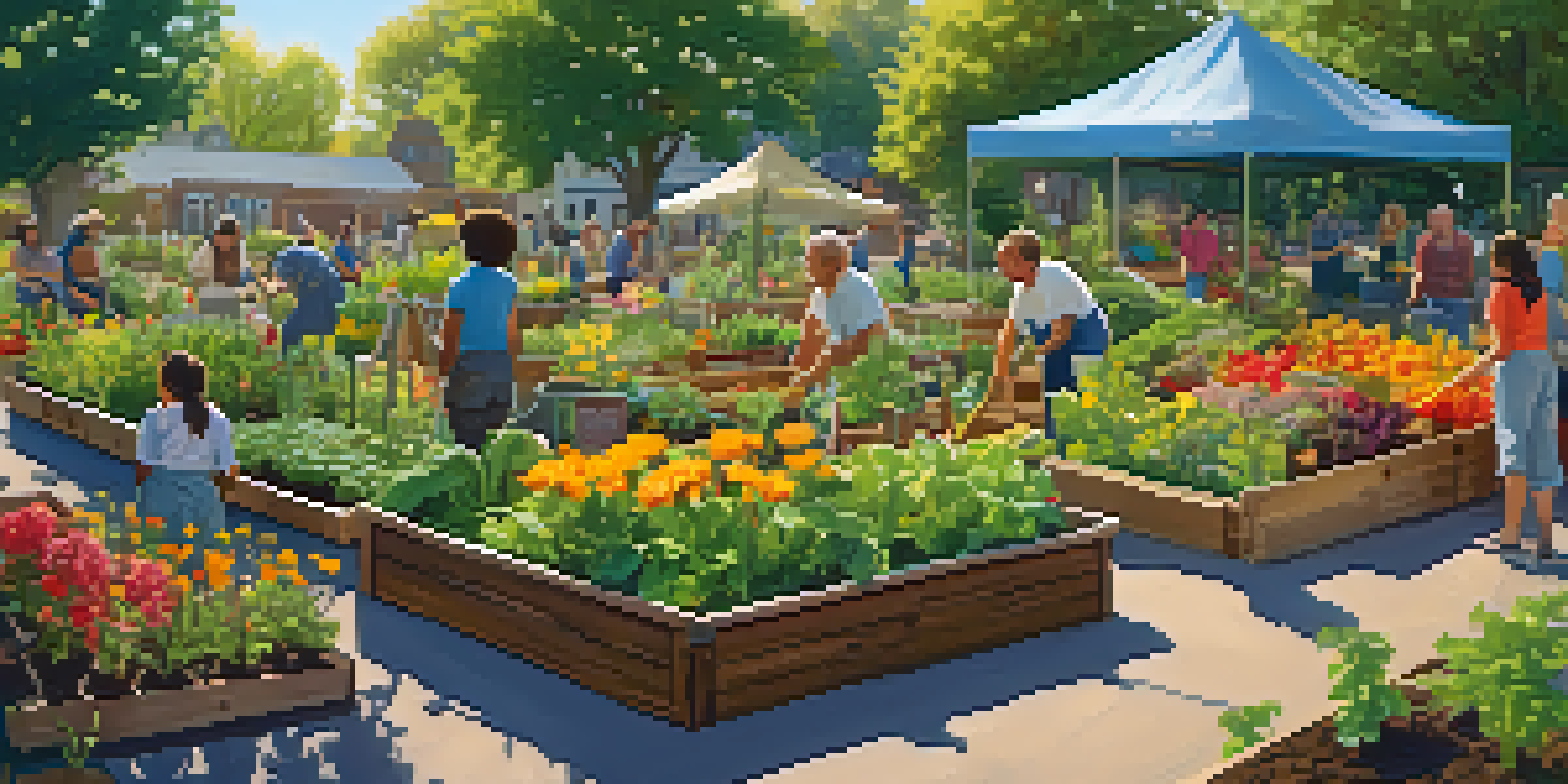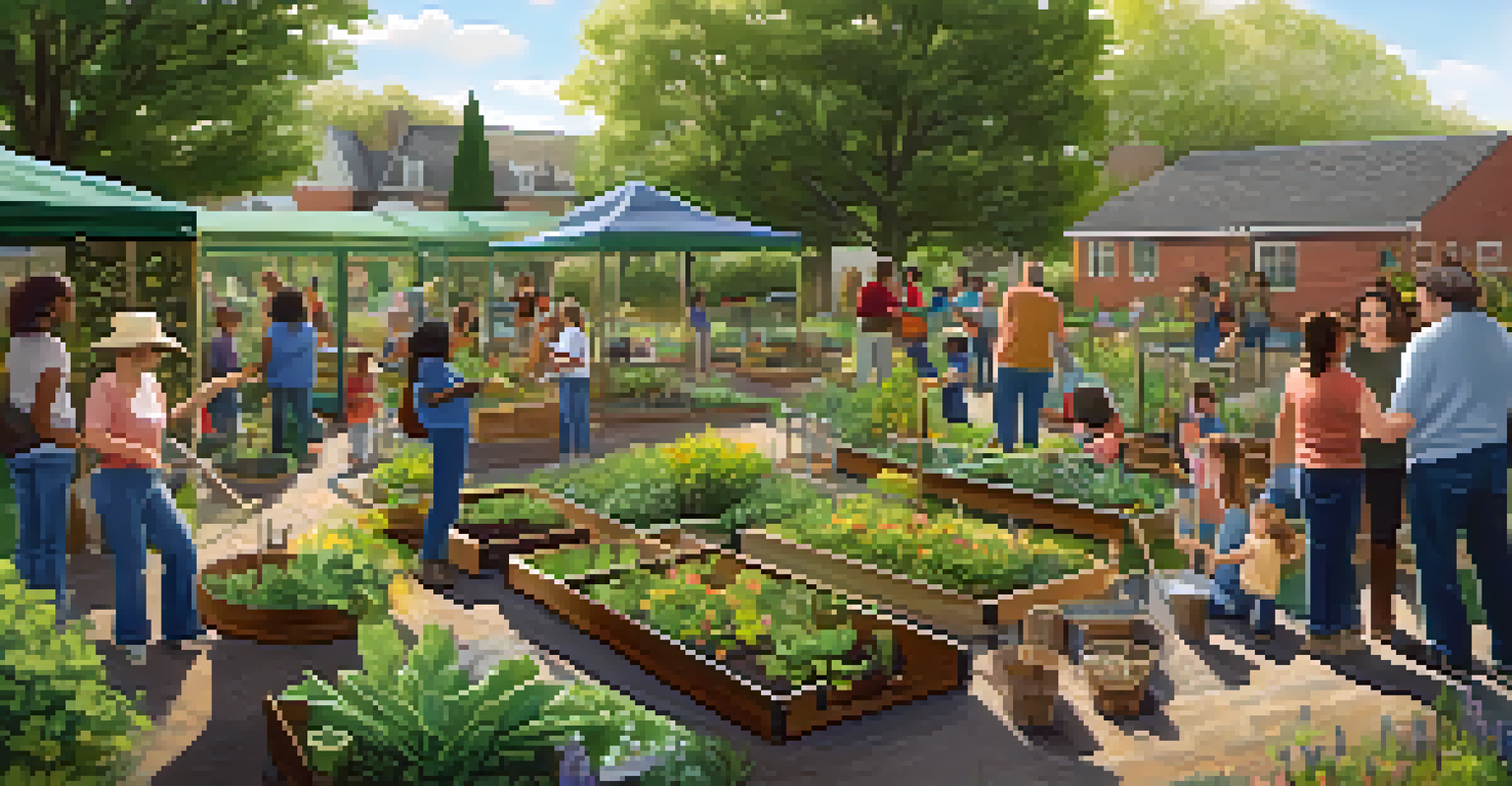The Benefits of Community Gardening for Local Neighborhoods

Community Gardening: A Catalyst for Neighborhood Unity
Community gardening brings people together, fostering a sense of belonging. When neighbors come together to cultivate a garden, they share not only resources but also stories, laughter, and a common goal. This shared experience can break down barriers, allowing individuals from diverse backgrounds to connect over their love for nature and gardening.
To plant a garden is to believe in tomorrow.
Moreover, the collaboration involved in maintaining a garden encourages teamwork and communication. Whether it’s organizing a planting day or planning a harvest celebration, these activities strengthen social ties and create lasting friendships. As community members work side by side, they develop trust and respect for one another.
Ultimately, a unified neighborhood often leads to a more vibrant and supportive environment. This sense of community can extend beyond the garden, encouraging residents to engage in other local initiatives, thereby creating a ripple effect of positive change throughout the neighborhood.
Promoting Sustainability Through Local Gardening Efforts
Community gardens serve as a powerful tool for promoting sustainability. They encourage the use of organic practices and help reduce carbon footprints by minimizing the distance food travels from farm to table. By cultivating their own fruits and vegetables, residents can enjoy fresh produce while contributing to a healthier planet.

In addition to food production, these gardens often incorporate composting and rainwater harvesting systems. This not only reduces waste but also teaches community members valuable skills related to sustainability. When people see the tangible benefits of these practices, they are more likely to implement them at home, thereby amplifying the positive environmental impact.
Community Gardens Unite Neighbors
Community gardens bring people together, fostering connections and friendships among diverse individuals.
Furthermore, community gardens can enhance local biodiversity. By planting a variety of species, gardeners create habitats for pollinators and other beneficial creatures. This encourages a thriving ecosystem that contributes to the overall health of the neighborhood.
Boosting Mental Health and Well-being in the Community
Engaging in gardening activities has been shown to have significant mental health benefits. Spending time outdoors, tending to plants, and nurturing the earth can reduce stress and anxiety. The calm and peaceful environment of a garden provides an escape from the hustle and bustle of daily life.
Gardening adds years to your life and life to your years.
Moreover, community gardens offer a space for individuals to engage in physical activity. Whether digging, planting, or weeding, these tasks promote healthy movement and can improve overall well-being. The combined effects of exercise and connection to nature create a powerful antidote to the pressures of modern living.
Additionally, the social interactions that occur in these spaces can combat feelings of loneliness. As people cultivate relationships through gardening, they build a support network that enhances their emotional resilience, ultimately leading to a happier and healthier community.
Enhancing Local Food Security and Accessibility
Community gardens play a crucial role in improving local food security. By growing their own produce, neighborhoods can reduce reliance on distant grocery stores, ensuring access to fresh fruits and vegetables. This is especially important in areas labeled as food deserts, where healthy food options may be limited.
In addition to providing fresh food, these gardens often encourage knowledge sharing among community members. Workshops on cooking, preserving, and nutrition can empower residents with the skills they need to make sustainable food choices. This education fosters a culture of health and wellness within the community.
Gardens Enhance Local Food Security
By growing their own produce, neighborhoods can improve access to fresh food, especially in areas with limited options.
Moreover, surplus produce can be shared with those in need, creating a spirit of generosity. By donating excess harvests to local food banks or community kitchens, gardeners can help alleviate hunger and promote equity, making fresh food accessible to all.
Creating Beautiful and Inviting Public Spaces
Community gardens transform neglected or empty lots into vibrant green spaces. This beautification not only enhances the aesthetic appeal of a neighborhood, but it also promotes a sense of pride among residents. Well-maintained gardens can become focal points for community gatherings, celebrations, and events.
Additionally, these gardens can attract wildlife, including birds and butterflies, adding to the natural beauty of the area. The presence of such wildlife creates an inviting atmosphere that encourages residents and visitors to spend time outdoors. It’s amazing how a patch of greenery can elevate the overall ambiance of a neighborhood.
As more people visit these gardens, local businesses may also benefit from increased foot traffic. It creates opportunities for collaboration between gardeners and local shop owners, fostering a community-centric economy that thrives on shared interests and support.
Encouraging Educational Opportunities for All Ages
Community gardens serve as excellent educational resources for all ages. Schools often partner with local gardens to provide hands-on learning experiences for students, teaching them about biology, ecology, and nutrition. These lessons are not only informative but also inspire a sense of stewardship towards the environment.
Moreover, gardening workshops and classes can be organized for adults and seniors, offering opportunities to learn new skills and share knowledge. From planting techniques to pest management, these sessions create a rich learning environment that benefits everyone involved. It’s a wonderful way to engage the community in lifelong learning.
Gardening Boosts Mental Well-being
Engaging in gardening activities promotes mental health by reducing stress and encouraging physical activity.
Additionally, children who participate in gardening activities often develop a greater appreciation for nature. These early experiences can instill values of sustainability and environmental responsibility, ensuring that future generations continue to prioritize and protect their local ecosystems.
Building Resilience in Communities Through Gardening
The act of gardening itself can cultivate resilience within communities. When residents work together to overcome challenges, such as pests or unfavorable weather, they learn valuable problem-solving skills. This collective effort fosters a sense of agency and empowerment, which can be applied to other areas of community life.
Community gardens can also be a source of food and resources during emergencies or crises. Having a local food source can provide comfort and sustenance in times of need, reinforcing the importance of self-sufficiency. This preparedness can strengthen community bonds as residents navigate challenges together.

Finally, the experience of gardening can inspire a proactive mindset. As community members engage in planning and maintaining their gardens, they become more invested in the future of their neighborhood, driving positive change and resilience for years to come.